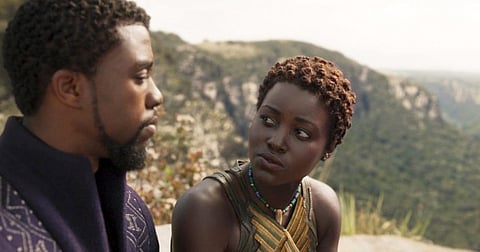Hollywood summer gives more than popcorn to chew on
‘Crazy Rich Asians’, ‘Black Panther’ and ‘BlacKkKlansman’ get people thinking

The summer of 2018 might best be remembered as the season when popcorn came with extra smart.
Consider Crazy Rich Asians: As a deliciously conventional rom-com, it plunges viewers into the fizziest pleasures of the genre, including scenes of profligate wealth, promiscuous consumerism, sigh-inducing wish fulfilment and delicious clothing and food.
Yet nestled into the film’s bounty of escapist tropes lie some kernels of deeper wisdom. In his adaptation of Kevin Kwan’s best-selling novel, director Jon Chu gracefully addresses cultural clashes within and between the Chinese and Chinese-American communities, including an interrogation of traditional ideas about filial piety, valuing duty over happiness and the empty promise of self-fulfillment.
The serious subtext in Crazy Rich Asians is just the latest in a string of movies that have punched far above their weight when it comes to their core ideas.
As it happens, most of those films have been made by African-American filmmakers who have used their platforms to bring black intellectuals and their theories further into the mainstream. In Black Panther, for example, the competition between Chadwick Boseman’s T’Challa and Michael B. Jordan’s Erik Killmonger comes down to a generations-old debate between the tactics of respectability and revolution, with T’Challa advocating peaceful (and isolated) coexistence with the global system and Killmonger calling for its violent overthrow. As a celebration of pan-Africanism and a critique of Africa’s colonial history, Black Panther pays tacit, if not obvious, homage to forebears as diverse as Marcus Garvey and Frantz Fanon to Booker T. Washington and W.E.B. Du Bois.
It’s no accident that Killmonger’s hometown is Oakland, California: The original comic book, published in 1966, was named after the political organisation that formed the same year in that town by Huey Newton and Bobby Seale. Indeed, Oakland has become a metonym for black radical thought in other films this year, including Boots Riley’s Sorry to Bother You and Blindspotting, each of which addresses issues of identity, gender, class, assimilation, resistance and cultural appropriation.
You won’t necessarily hear those words uttered in either film. But they infuse each of them because they infuse Oakland itself. Riley grew up there as the child of activists and has followed in their footsteps; Rafael Casal and Daveed Diggs, who wrote and star in Blindspotting, lived in the area as well. The city’s role as political and intellectual incubator “had to be in the DNA of the [movie], because that’s true of Oakland,” said Diggs, who recalled being taken on walking tours of Oakland by Seale when he was 12 years old. So the theories the movie engages, he added, “are not abstract.”
Nor are they abstract in BlacKkKlansman, in which Spike Lee tells the story of an African-American detective going undercover in the Ku Klux Klan in the 1970s, while questioning his own relationship to black militancy and the “double consciousness” first identified by Du Bois in his 1903 book The Souls of Black Folk. Lee makes a point of using the term “double consciousness” in BlacKkKlansman, and he casts Harry Belafonte as a civil rights veteran who in a stirring sequence recounts a 1916 lynching that Du Bois observed and reported for the NAACP journal the Crisis.
Each of these movies balances didacticism and entertainment with varying degrees of ease. But all of them interweave those impulses in ways that feel of a piece and organic. In his 1991 article Deep in the Shed: The Discourse of African-American Cinema, professor Todd Boyd described filmmaking as “an act of black intellectual activity, specifically referring to Spike Lee and Robert Townsend as directors whose storytelling, visual styles and grounding in oral traditions effectively rewrote a narrative heretofore controlled by white academia and publishing.
Rather than authors and professors, Boyd wrote, it was African-American poets and novelists, and more recently musicians and movie directors, who were “rewriting... American history, society and culture with a black pen.”
In an interview this week Boyd noted that “the visibility of black intellectuals has increased dramatically” since he wrote his 1991 essay. Citing such well-known public intellectuals as Henry Louis Gates Jr, Cornel West and bell hooks, Boyd observed that, absent the necessity of filling what was once a gap in academia and social debate, the “intellectual creativity of black films has ebbed and flowed.”
Still, there’s no doubt that the directors behind Black Panther, Sorry to Bother You, Blindspotting and BlacKkKlansman are carrying on what is now a black filmmaking tradition, albeit one borne of African Americans once being excluded from academic circles. “If you look at the history of black culture,” Boyd said ruefully, “it has always been asked to be more than just entertainment.” Whether in the form of an otherwise conventional comic book movie, a gonzo midnight indie, a rap musical or an often raucous cop caper, black filmmakers are still expanding and redefining what we consider to be the American patrimony — not just as artists, but as our most valuable and eloquent public thinkers.


